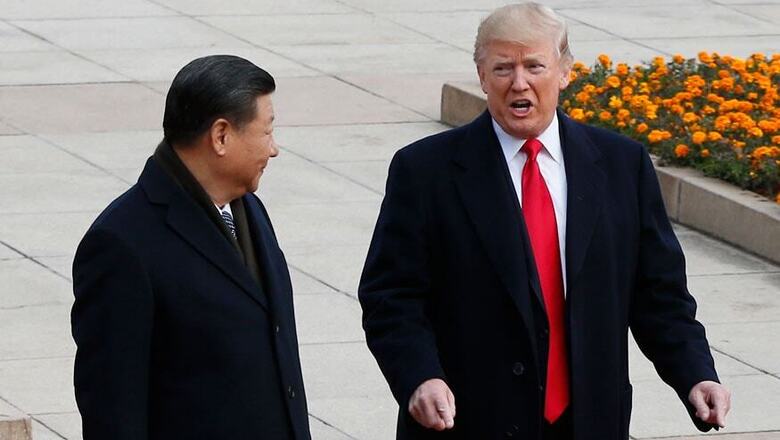
views
China's foreign ministry on Friday said that it firmly opposes executive orders announced by US President Donald Trump on Thursday banning US transactions with the Chinese owners of messaging app WeChat and video-sharing app TikTok.
China will defend the legitimate rights and interests of Chinese businesses, foreign ministry spokesman Wang Wenbin told a media briefing.
Trump has ordered sweeping restrictions against Chinese-owned social media giants TikTok and WeChat that could strangle their ability to operate in the United States.
The executive order, which takes effect in 45 days, bars anyone under US jurisdiction from doing business with the owners of TikTok or WeChat.
It heaps pressure on ByteDance, TikTok's parent, to close negotiations to sell to Microsoft and further escalates the Trump administration's multi-front confrontation with Beijing.
Trump's order cites a threat to "national security, foreign policy, and economy of the United States", as the president seeks to curb China's power in global technology.
The move sent shares in the parent company of WeChat into a spin, with the issue tanking as much as 10 percent at one point in Friday trade, wiping almost $50 billion off Tencent's market capitalisation.
It also adds to a laundry list of issues that have ratcheted up tensions between the superpowers, including Hong Kong, trade, Huawei, the South China Sea and the spread of the coronavirus.
Last month Washington ordered the closure of the Chinese consulate in Houston -- accusing it of being a centre for spies. China hit back by shutting the US mission in Chengdu.
The two sides have also been engaged in a war of words over who is to blame for the coronavirus since Trump first described it as a "Chinese" illness in March.
On Wednesday tensions were further stoked when the US announced its highest-level visit to Taiwan since Washington switched diplomatic recognition to China in 1979, a move blasted by Beijing, which views the self-ruled island as a breakaway territory.
"TikTok automatically captures vast swaths of information from its users, including Internet and other network activity information such as location data and browsing and search histories," Trump's order said.
Data could potentially be used by China to track the locations of federal employees and contractors, build dossiers on people for blackmail, and conduct corporate espionage, it alleged.
'Watershed moment'
The TikTok mobile app has been downloaded some 175 million times in the US and more than a billion times around the world.
The US Senate voted Thursday to bar TikTok from being downloaded onto US government employees' telephones, intensifying US scrutiny of the popular app.
The bill passed by the Republican-controlled Senate now goes to the House of Representatives, led by Democrats.
Several US agencies already bar employees from downloading TikTok onto their phones. "This is yet another watershed moment in the US-China technology cold war," Paul Triolo, head of global technology policy at Eurasia Group, told Bloomberg.
"It shows the depth of the US concern."
India last month also outlawed TikTok along with 58 other Chinese apps, citing data security fears. Trump has set a deadline of mid-September for TikTok to be acquired by a US firm or be banned in the United States.
Microsoft has expanded its talks on TikTok to a potential deal that would include buying the global operations of the fast-growing app, the Financial Times reported Thursday.
Microsoft declined to comment on the report, after previously disclosing it was considering a deal for TikTok operations in the US, Canada, Australia and New Zealand.
'Keeping tabs'
TikTok's kaleidoscopic feeds of short video clips feature everything from hair-dye tutorials to dance routines and jokes about daily life.
The company on Thursday announced plans for its first data center for European users, to be set up in Ireland.
WeChat is a messaging, social media, and electronic payment platform and is reported to have more than a billion users. It is not widely used in the US but in China it is difficult to function without it as the platform is used by nearly all businesses instead of email.
Trump's order contended that WeChat captures user data that could then exploited by the Chinese government but provided no evidence that is happening.
"WeChat captures the personal and proprietary information of Chinese nationals visiting the United States," the order read, "thereby allowing the Chinese Communist Party a mechanism for keeping tabs on Chinese citizens who may be enjoying the benefits of a free society for the first time in their lives."


















Comments
0 comment